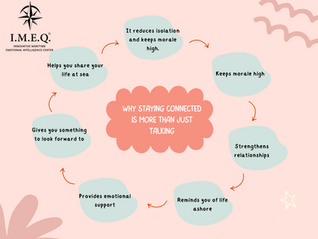Would a zero-alcohol policy be feasible?
- IMEQ CENTER

- Sep 24, 2023
- 3 min read

A zero-alcohol policy onboard for seafarers has been proposed by many shipping companies and regulatory bodies with the intention of ensuring safety and minimizing accidents related to alcohol consumption. However, there are several concerns and arguments that suggest that such a policy might not be as effective or could even be counterproductive.
For many sailors, drinking has been a longstanding tradition, serving as a way to bond or cope with the stresses and isolation of long voyages. Instituting a total ban might come across as disregarding these cultural and historical practices, which are deeply ingrained. Additionally, enforcing a zero-alcohol policy can be fraught with challenges. Without implementing regular breathalyzer tests or similar measures, ensuring that sailors are abstaining from alcohol consumption becomes difficult.
There's also the risk that a strict ban might push seafarers to secretly smuggle alcohol aboard or even resort to brewing their own, potentially leading to more hazardous and unregulated drinking habits. The mental well-being of sailors is another concern. The isolation and unique pressures of life at sea can lead to mental health challenges, and while alcohol should not be viewed as a healthy coping mechanism, a total prohibition without offering alternative means of relaxation and stress relief might worsen these issues.
Furthermore, when ships make port calls, sailors often get the chance to take short breaks. Even if there's a strict no-alcohol policy on the ship, there's little to prevent sailors from consuming alcohol during these shore leaves, which would render the onboard policy ineffective. Instituting such a ban might also be perceived as a mistrust of the sailors' professionalism, potentially leading to decreased morale and negatively impacting job performance.
Moreover, there could be strong pushback from seafarers against such policies. A restrictive approach could make the profession less attractive to both potential recruits and current sailors. Instead of outright bans, it might be more constructive to address the root causes leading to excessive drinking, like isolation, stress, or a lack of recreational activities. Some argue that it would be more effective and practical to promote responsible drinking and set reasonable limits, which would recognize the cultural and social importance of drinking while still encouraging moderation.
Lastly, there are potential legal and ethical concerns associated with such policies. Depending on the jurisdictions and the specific regulations in place, the implementation and enforcement of these policies might face legal challenges, especially if seafarers feel their personal rights are being violated.
While the rationale behind a zero-alcohol policy is commendable, its practical implications, effectiveness, and potential unintended consequences must be closely considered. It's essential to find a balance that both prioritizes safety and respects the well-being and traditions of seafarers.
Here's some potential solutions:
Awareness and Education: Begin with comprehensive education programs that highlight the dangers of excessive alcohol consumption, especially in a maritime setting. Make sure seafarers understand the risks involved and the reason behind any restrictions.
Promote Moderation: Instead of a total ban, set clear limits on alcohol consumption. For example, restrict the amount of alcohol that can be consumed in a given period, especially if a seafarer is on duty within the next 24 hours.
Mental Health and Well-being Initiatives: Address the root causes of excessive drinking by offering programs that support sailors' mental well-being. This could include counseling services, stress-relief activities, and other recreational opportunities that provide a healthy outlet for the stresses of seafaring.
Regular Health Checks: Incorporate regular health checks that, while not exclusively targeting alcohol consumption, ensure that seafarers are in good physical and mental health. This can help in early identification of any potential issues.
Transparent Reporting and Support Mechanisms: Encourage sailors to report if they or their peers are struggling with alcohol dependence. Create an environment where they can seek help without stigma.
Cultural Sensitivity Training: Recognizing the cultural significance of alcohol in many maritime traditions, offer cultural sensitivity training that helps bridge the gap between safety regulations and traditional practices.
Feedback Mechanism: Set up a system where seafarers can provide feedback on the alcohol policy, suggest improvements, and voice their concerns. This will ensure that they feel heard and are more likely to comply with regulations.
Random Testing with Dignity: If alcohol testing is deemed necessary, it should be done randomly but with respect for the individual's dignity. The goal is to ensure safety without creating an atmosphere of distrust.
Review and Revise Policies: Regularly review the alcohol policy to assess its effectiveness. Make necessary revisions based on feedback from seafarers and any incidents that may occur.
Collaboration with Port Authorities: Work closely with port authorities to ensure that sailors are not excessively consuming alcohol during shore leaves, which could jeopardize the effectiveness of onboard policies.
In essence, the solution lies in striking a balance. It's about creating a supportive environment where seafarers are educated about the risks, given the tools to manage stress and mental health challenges, and are empowered to make responsible decisions





































































































Comments